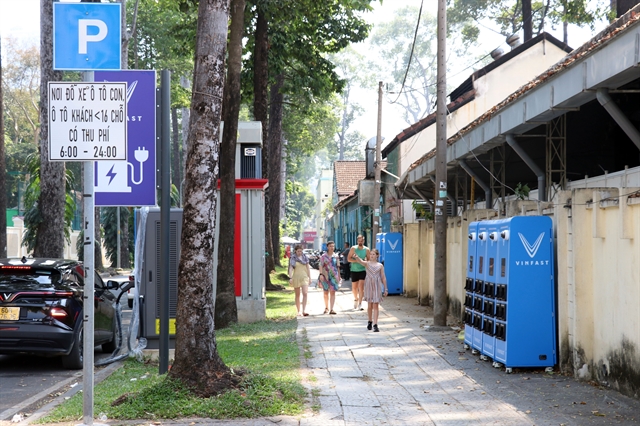 Economy
Economy


|
| OECD Chief Economist Álvaro S. Pereira presents the survey's findings in Hà Nội, June 21. VNA/VNS Photo Khoa Anh |
HÀ NỘI - Việt Nam has made notable reform progress over the past decades, supporting sustained economic growth, according to the latest Economic Survey released by the Organisation for Economic Co-operation and Development (OECD) on June 21.
The survey projects that Việt Nam’s gross domestic product (GDP) will grow by 6.2 per cent in 2025 and 6.0 per cent in 2026, primarily driven by domestic demand.
Inflation is expected to remain below the State Bank of Việt Nam’s target of 4.5–5.0 per cent, at 3.7 per cent in 2025 and 3.8 per cent in 2026. Real GDP per capita in 2023 was 5.7 times higher than in 1990.
Despite the country’s progress, the OECD notes that Việt Nam faces several challenges, including trade policy uncertainty, an ageing population and the impacts of climate change.
To address these issues, the report recommends advancing structural reforms to enhance competition, improve labour market access, and promote sustainable growth.
The OECD identifies maintaining Việt Nam’s appeal to foreign direct investment (FDI) as a key priority. Strengthening linkages between multinational corporations and domestic enterprises is seen as essential to maximise the benefits of FDI, according to OECD Chief Economist Álvaro Pereira.
The report also suggests that a more price-based monetary policy framework, without direct credit growth targets, could enhance competition in financial markets and improve capital allocation.
Fiscal policy is expected to continue supporting growth through increased public investment and should be prepared to respond further if needed, particularly in light of recent tariff increases.
Improving education, especially at the upper secondary and higher education levels, and aligning with business sector needs would help raise productivity.
The OECD recommends strengthening competition in the service sector by easing market entry, reducing restrictions on foreign investment, and creating a more level playing field between state-owned and private enterprises.
The survey highlights rising spending requirements for social security and climate transition, while tax revenues remain low at 19 per cent of GDP.
It calls for tax system reforms to mobilise additional revenue by reducing tax expenditures on personal income tax and value-added tax, and improving fiscal transparency and governance.
Reducing informality is identified as essential to making growth more inclusive. An estimated 68.5 per cent of workers are employed informally, and social security coverage remains limited. The OECD welcomes recent reforms aimed at expanding access to pensions and healthcare.
It also recommends lowering social security contributions for low-income earners and simplifying business registration procedures to support formalisation.
Addressing climate change is a key concern. While Việt Nam has committed to achieving net-zero carbon emissions by 2050, energy consumption continues to rise, with coal use reaching record levels.
The survey stresses the importance of phasing out coal-fired power and accelerating the adoption of renewable energy to ensure sustainable growth. VNS




